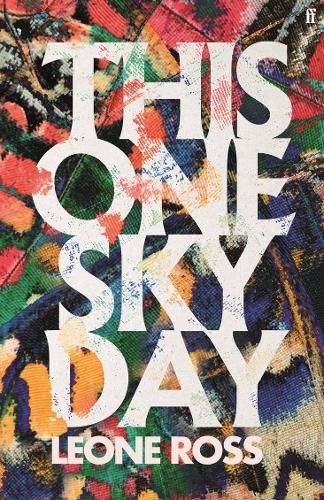Richard Gwyn reviews This One Sky Day from Leone Ross, a magic-realist novel following the surrealist events of one single day in an imagined archipelago.
In her new novel, fifteen years in the making, the British-Jamaican author Leone Ross offers the reader an imagined island, like Coleridge’s caverns, measureless to man. The novel, taken as whole, is an infectious celebration of life, and especially of love, in all its divergent glories and sorrows, as well as a timely reminder of the perils of judgmentalism and prejudice.
On Popisho, a Caribbean nation in which the inhabitants are blessed with unique attributes, ‘a little something-something’ called ‘cors’— for example, the ability to talk with animals, or walk through walls — the ruthless Governor Intiasar controls the local economy with his monopoly of the toy factories, staffed by woefully underpaid workers, through which the island gains its revenue, and its leaders their fortunes. In response to this injustice, among others, a mysterious graffiti artist has daubed the walls of the factories with exhortations in orange paint, notably THERE IS AN ALTERNATIVE, while a group of scavenging indigents, reviled and outcast, who inhabit the nearby Islands of the Dead, serve as a collective scapegoat for all the failures and frustrations of the population at large.
The island of Popisho is itself a wondrously unreliable narrator, a place that harvests stories as readily as its supply of edible and intoxicating butterflies, and it evoked, for me, the Macondo of Gabriel García Márquez’s One Hundred Years of Solitude, one of the fictional worlds that serves as a precursor for this equally inventive novel. There are other influences: the author herself has mentioned Toni Morrison and Roald Dahl, among others, but I was reminded also of Alejo Carpentier and Jean Rhys, also Caribbean writers with a sharp eye for the follies and foibles of humankind.

The novel follows a single day in the life of three characters and their interlocking stories: one is Anise, whose ‘cors’ is to heal others, although she is unable to heal herself of whatever ailment causes her own babies to be stillborn. Anise has a cheating husband, but her quest to track him down and confront him leads her somewhere far more interesting, as she joins the riotous residents of a brothel in their resistance to a group of overly pushy punters.
Romanza Intiasar, the disowned teenage son of the Governor, whose cors is the facility to tell truth from lies, has fled the family home to live among the indigents with his male lover, Pilar. During the course of the day he comes across Xavier Redchoose — the novel’s central character — gifted with the ability to impress flavour into food, with the mere touch of his fingers. This awesome endowment has earned him the title of ‘macaenus,’ which carries with it the obligation to feed every citizen, once, and at an opportune time, in his restaurant — aptly called The Torn Poem. On the day in question, Xavier has been asked by the Governor to prepare the wedding feast for his daughter, Sonteine, and the request, more especially the man who has made it, vexes him greatly.
One of the features of island life is the preponderance of butterflies, which can be grabbed in mid-flight and eaten, offsetting a brief but glorious intoxication. If butterfly-quaffing is the equivalent of a fine wine or a spliff of quality ganja, the consumption of moth is something darker, shameful and more dangerous: a Popisho version of crystal meth. Xavier is a conflicted man, haunted both by the ghost of his dead wife and his addiction to moth. He has been in recovery for quite some time, but when a young fisherman gifts him a prize moth, he secretes it carefully away in a cloth pouch and carries it with him, just in case.
Popisho is a wonderfully sensuous island, and its qualities are those of abundance: fruit orchards, vines and resplendently coloured flowering bushes that border and encroach upon the human dwelling places. The scents of green pepper, ginger and cardamon float dense on the air. This sensory abundance is so all-encompassing that one is not surprised when things get out of hand, as they do, in the course of the day — the inevitable consequence, one feels, of ‘too-muchness’ — houses bend and shudder, an avalanche of scarlet physalis flowers fall from the sky forming immense puffy snowdrifts, and, alarmingly, women’s vulvae, or ‘pum-pums’, drop from their prescribed places and have to be snatched up and hidden from harms’s way, or better still, reattached, before being lost and picked up by the wrong owner. To rack up the tension a little more, a hurricane is on its way.
But just as magical mayhem threatens to overwhelm the narrative, there are moments of exquisite tenderness and beauty, one of which involves the emerging friendship between Xavier and Romanza, when, in the course of a short sea crossing to the Dead Islands, Romanza steps from the canoe and appears to walk on water, beckoning Xavier to follow. The notion has a famous biblical precedent, of course, but on this occasion walking on water seems simply to be the natural course of things; rather than a show of divine intervention, their feat is merely an emanation of the island, whose colours, scents and music permeate the lives of its inhabitants in magical ways. As Romanza comments to Xavier, while the two stroll across the coral reef and look down on yellow sea anemones and smiling runner fish, ‘I hear some places in the world prettier than Popisho, but I can’t believe it.’ I, for one, was converted, and relished my brief time as a guest on Leone’s enchanted island. I’m suggesting a sojourn there to everyone I know, as a refreshing and subversive tonic for the times we live in.
This One Sky Day from Leone Ross is available now from Faber in the UK and as Popisho, published by Farrar, Straus and Giroux in the USA.











